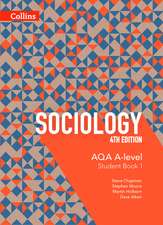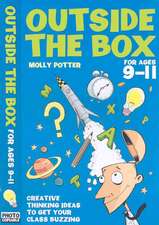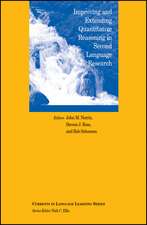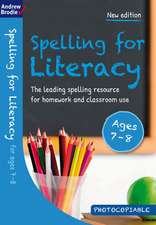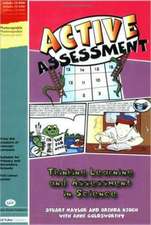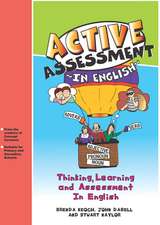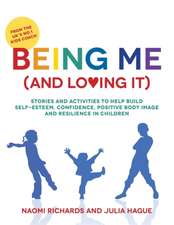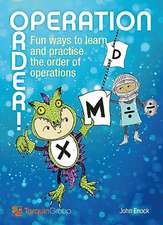Educational Algebra: A Theoretical and Empirical Approach: Mathematics Education Library, cartea 43
Autor Eugenio Filloy, Teresa Rojano, Luis Puigen Limba Engleză Paperback – 29 noi 2010
Disciplines such as Linguistics, Logic, Psycholinguistics, Semiotics, general Cognitive Psychology, Mathematics Psychology, Mathematics Epistemology, History of Mathematics, and others have carried out research on the same topics approached by Mathematics Education and have redefined their results within the framework of their respective fields. Specifically, theorists in Linguistics, Information Processing and Didactics of Mathematics have done important work on the notion of code. Today, this notion is a key element to interpreting the idea of representation in the new explanatory models of cognitive problems placed by alternative teaching approaches, including those involving a technological environment. Additionally, Psycholinguistics and Artificial Intelligence in procedural models of human abilities have intended to explain how and why users of mathematical language naturally and commonly make mistakes in syntactical procedures.
Educational Algebra: A Theoretical and Empirical Approach adds to previous developments with priority given to a pragmatic perspective on "meaning in use" over "formal meaning". The bulk of these approaches and others of similar nature have lead to a focus on competence rather than on a user’s activity with mathematical language.
Such a shift in perspective has fundamental implications on the way mathematical language is studied. Essentially, Grammar—the abstract formal system—and Pragmatics—the principles of the use of language—are complementary domains in this volume. Both are related to different teaching models, whether new or traditional, used in helping students to become competent users of Algebra. Because of this, Educational Algebra: A Theoretical and Empirical Approach will be of interest to researchers and practitioners within the mathematics education field.
| Toate formatele și edițiile | Preț | Express |
|---|---|---|
| Paperback (1) | 945.14 lei 6-8 săpt. | |
| Springer Us – 29 noi 2010 | 945.14 lei 6-8 săpt. | |
| Hardback (1) | 1386.92 lei 6-8 săpt. | |
| Springer Us – 11 oct 2007 | 1386.92 lei 6-8 săpt. |
Din seria Mathematics Education Library
-
 Preț: 389.70 lei
Preț: 389.70 lei - 15%
 Preț: 645.96 lei
Preț: 645.96 lei - 18%
 Preț: 742.97 lei
Preț: 742.97 lei - 18%
 Preț: 1394.84 lei
Preț: 1394.84 lei - 18%
 Preț: 947.50 lei
Preț: 947.50 lei - 18%
 Preț: 1544.80 lei
Preț: 1544.80 lei - 15%
 Preț: 652.49 lei
Preț: 652.49 lei - 18%
 Preț: 1385.67 lei
Preț: 1385.67 lei - 18%
 Preț: 1225.48 lei
Preț: 1225.48 lei - 15%
 Preț: 643.34 lei
Preț: 643.34 lei - 18%
 Preț: 1221.07 lei
Preț: 1221.07 lei - 18%
 Preț: 952.89 lei
Preț: 952.89 lei - 18%
 Preț: 950.52 lei
Preț: 950.52 lei - 24%
 Preț: 1445.40 lei
Preț: 1445.40 lei - 18%
 Preț: 1224.54 lei
Preț: 1224.54 lei - 15%
 Preț: 651.19 lei
Preț: 651.19 lei -
 Preț: 391.61 lei
Preț: 391.61 lei - 18%
 Preț: 948.16 lei
Preț: 948.16 lei - 18%
 Preț: 944.19 lei
Preț: 944.19 lei - 18%
 Preț: 1380.95 lei
Preț: 1380.95 lei - 18%
 Preț: 947.85 lei
Preț: 947.85 lei - 18%
 Preț: 948.61 lei
Preț: 948.61 lei - 15%
 Preț: 635.31 lei
Preț: 635.31 lei - 15%
 Preț: 644.63 lei
Preț: 644.63 lei - 15%
 Preț: 646.43 lei
Preț: 646.43 lei - 15%
 Preț: 647.59 lei
Preț: 647.59 lei
Preț: 945.14 lei
Preț vechi: 1152.61 lei
-18% Nou
Puncte Express: 1418
Preț estimativ în valută:
180.87€ • 187.76$ • 150.82£
180.87€ • 187.76$ • 150.82£
Carte tipărită la comandă
Livrare economică 24 martie-07 aprilie
Preluare comenzi: 021 569.72.76
Specificații
ISBN-13: 9781441943897
ISBN-10: 1441943897
Pagini: 308
Ilustrații: XIV, 294 p.
Dimensiuni: 155 x 235 x 16 mm
Greutate: 0.44 kg
Ediția:2008
Editura: Springer Us
Colecția Springer
Seria Mathematics Education Library
Locul publicării:New York, NY, United States
ISBN-10: 1441943897
Pagini: 308
Ilustrații: XIV, 294 p.
Dimensiuni: 155 x 235 x 16 mm
Greutate: 0.44 kg
Ediția:2008
Editura: Springer Us
Colecția Springer
Seria Mathematics Education Library
Locul publicării:New York, NY, United States
Public țintă
ResearchCuprins
Curriculum Design and Development for Studens, Teachers and Researchers.- Experimental Design.- Concrete Models and Abstraction Processes.- Teaching Models.- Algebraic Syntax and Solving Word Problems.- Cognitive Tendencies and Abstraction Processes.- Mathematical Sign Systems. Meaning and Sense.- Solving Arithmetic-Algebraic Problems.- Widening Perspectives.- References. A Deep Sea of Luminescent Ideas.
Textul de pe ultima copertă
Given its abstract nature and the highly syntactical competence required by the use of symbolic algebra, research on its teaching and learning must rely on approaches that include semiotic concepts and analyses that recall the history of algebraic ideas, among others. Educational Algebra: A Theoretical and Empirical Approach deals with a theoretical perspective on the study of school algebra, in which both components (semiotics and history) occur. This perspective runs opposite to general theoretical models, since it submits components for the design of local frameworks for theoretical analysis. The Methodological design allows for the interpretation of specific phenomena and the inclusion, within such interpretative frameworks, of evidence not included in more general treatments. Such is the case of phenomena observed in subjects who are initiating the study of symbolic algebra, involving the production of personal sign systems at the intermediate level or the level previous to the mathematical sign system which is to be learned.
Disciplines such as Linguistics, Logic, Psycholinguistics, Semiotics, general Cognitive Psychology, Mathematics Psychology, Mathematics Epistemology, History of Mathematics, and others have carried out research on the same topics approached by Mathematics Education and have redefined their results within the framework of their respective fields. Specifically, theorists in Linguistics, Information Processing and Didactics of Mathematics have done important work on the notion of code. Today, this notion is a key element to interpreting the idea of representation in the new explanatory models of cognitive problems placed by alternative teaching approaches, including those involving a technological environment. Additionally, Psycholinguistics and Artificial Intelligence in procedural models of human abilities have intended to explain how and why users of mathematical language naturally and commonly make mistakes in syntactical procedures.
Educational Algebra: A Theoretical and Empirical Approach adds to previous developments with priority given to a pragmatic perspective on "meaning in use" over "formal meaning". The bulk of these approaches and others of similar nature have lead to a focus on competence rather than on a user’s activity with mathematical language.
Such a shift in perspective has fundamental implications on the way mathematical language is studied. Essentially, Grammar—the abstract formal system—and Pragmatics—the principles of the use of language—are complementary domains in this volume. Both are related to different teaching models, whether new or traditional, used in helping students to become competent users of Algebra. Because of this, Educational Algebra: A Theoretical and Empirical Approach will be of interest to researchers and practitioners within the mathematics education field.
Disciplines such as Linguistics, Logic, Psycholinguistics, Semiotics, general Cognitive Psychology, Mathematics Psychology, Mathematics Epistemology, History of Mathematics, and others have carried out research on the same topics approached by Mathematics Education and have redefined their results within the framework of their respective fields. Specifically, theorists in Linguistics, Information Processing and Didactics of Mathematics have done important work on the notion of code. Today, this notion is a key element to interpreting the idea of representation in the new explanatory models of cognitive problems placed by alternative teaching approaches, including those involving a technological environment. Additionally, Psycholinguistics and Artificial Intelligence in procedural models of human abilities have intended to explain how and why users of mathematical language naturally and commonly make mistakes in syntactical procedures.
Educational Algebra: A Theoretical and Empirical Approach adds to previous developments with priority given to a pragmatic perspective on "meaning in use" over "formal meaning". The bulk of these approaches and others of similar nature have lead to a focus on competence rather than on a user’s activity with mathematical language.
Such a shift in perspective has fundamental implications on the way mathematical language is studied. Essentially, Grammar—the abstract formal system—and Pragmatics—the principles of the use of language—are complementary domains in this volume. Both are related to different teaching models, whether new or traditional, used in helping students to become competent users of Algebra. Because of this, Educational Algebra: A Theoretical and Empirical Approach will be of interest to researchers and practitioners within the mathematics education field.
Caracteristici
Offers a theoretical perspective in which semiotics and history are included Adds to previous work with priority to a pragmatic perspective Of interest to both practitioners and researchers in mathematics education Includes supplementary material: sn.pub/extras

